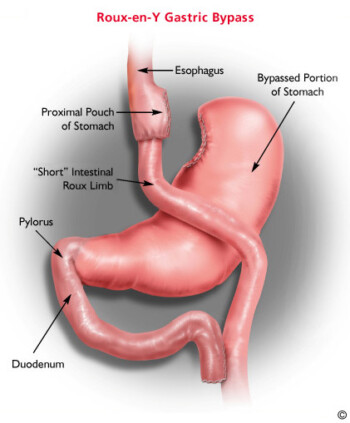Gastric Bypass
What is Gastric Bypass Surgery?
Gastric bypass surgery is one of the most common types of weight-loss surgery, also known as bariatric surgery. This procedure can be used to make changes to your stomach and digestive system that limit how much food you can eat and how many nutrients you absorb— all of which lead to losing unwanted weight.
While there are several types of gastric bypass surgeries, Roux-en-Y Gastric Bypass is the most popular, being long considered the "Gold Standard" of weight loss surgery procedures. It results in weight loss by significantly reducing the size of your stomach, so you cannot eat as much, and by bypassing your small intestines, so you absorb less fat from the foods you eat.
Benefits of Gastric Bypass Surgery
While losing 65-75% of your excess body weight is a significant change in how you look, the health benefits that you gain are much more substantial. Losing excess weight can help reduce your risk of potentially life-threatening weight-related health problems such as:
- Type 2 diabetes
- High blood pressure
- Heart disease and stroke
- Sleep apnea
- Nonalcoholic fatty liver disease (NAFLD) or nonalcoholic steatohepatitis (NASH)

The Procedure
The Roux-en-Y Gastric Bypass operation has been around since the 1960s and as a provent record of being one of the most effective in weight reduction and weight loss maintenance. Dr. Howard performs this surgery for patients in The Woodlands and Houston area using laparoscopic techniques. This avoids the need for a large incision in your abdomen. In some cases, however, an abdominal incision is necessary based on your weight, body shape, and previous surgical history.
A small stomach pouch (about the size of a medium egg) is created with a stapler device. The small intestines are then divided, and one end brought up and connected to the small stomach pouch. The intestines are reconnected further downstream.
The gastric bypass works in two important ways. First, the newly created stomach pouch is considerably smaller. This reduces the amount of food you eat, therefore reducing the number of calories you consume. Additionally, because of the "bypass” of a portion of the gastrointestinal tract, fewer calories and nutrients are absorbed. Second, the rerouting of the food stream produces changes in gut hormones that promote satiety and suppress hunger.
How Much Weight Can You Lose With Gastric Bypass Surgery?
On average, people lose anywhere from 60-80% of their excess weight.
Weight loss is most significant during the early months following surgery. During this time, you must take in enough protein to recover from your surgery. Dr. Howard will help you with how to eat and getting the nutritional supplements you need as you go through this transformation.
The rate of weight loss slows during each succeeding month and usually stabilizes between 12 to18 months after surgery. The amount of weight loss cannot be precisely predicted as weight loss depends on many factors, including your age, preoperative weight, and the amount of physical activity that you do.
Do Gastric Bypass Surgery Patients Regain the Weight?
A word of caution: your weight loss surgery limits the amount of solid food that you can tolerate, but has less of an effect on the consumption of liquids. Drinking high-calorie liquids will slow your weight loss. After the eighth week, you will be encouraged to eat five small meals a day, so be sure to eat foods high in protein and drink low-calorie fluids.
If food consumption or calorie intake increases after you have reached a healthier weight, some weight may be regained. Patients who desire to lose additional pounds must restrict caloric intake or increase their amount of daily exercise.
The weight loss surgery will give you the "kick start" to lose weight, but you must help by exercising and using caution and good judgment with your food intake. Dr. Howard can help you connect with a dietitian who can assist with creating healthy meal plans that work with your lifestyle.
Who is Eligible for Gastric Bypass Surgery?
If you're significantly overweight and want to make a lifestyle change, you may be a candidate for gastric bypass surgery. You might be a candidate if:
- You have a Body Mass Index (BMI) of 40 or higher.
- You have a BMI of 35 or higher and experience severe negative health effects related to being obese such as type 2 diabetes or cardiac conditions.
- You cannot achieve a healthy body weight for a sustained period, even through medically-supervised dieting and exercising.
- You are willing and able to follow through with diet and exercise recommendations made by your health care team.
For more information on the Roux-en-Y Gastric Bypass operation or to schedule an appointment with Dr. Howard, request a consultation today.